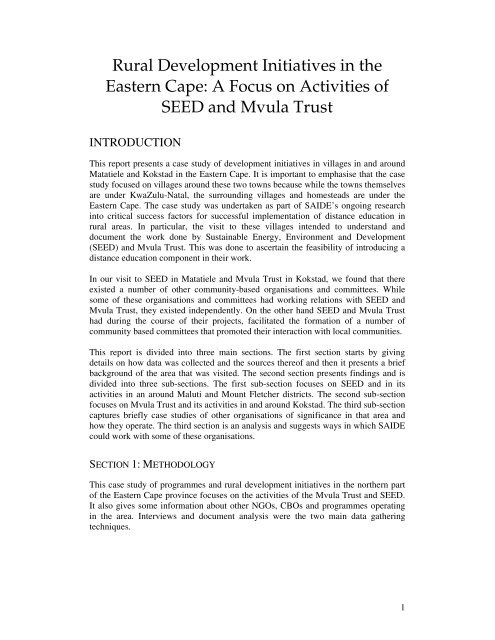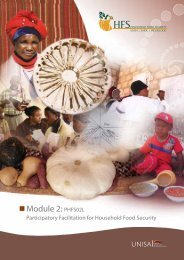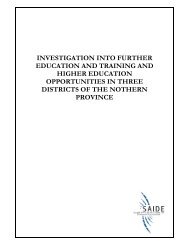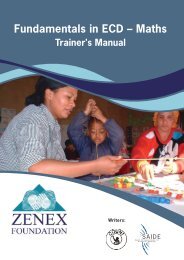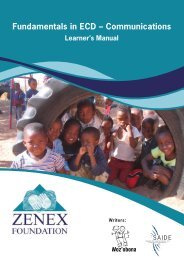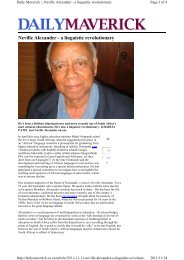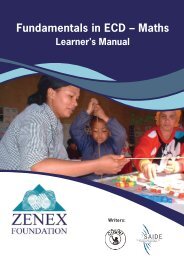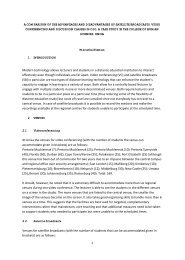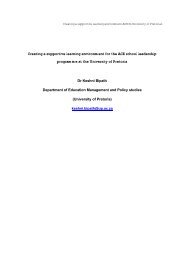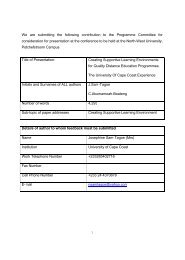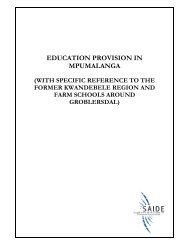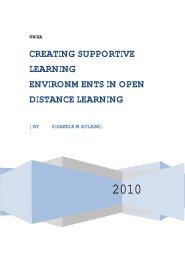Rural Development Initiatives in the Eastern Cape - South African ...
Rural Development Initiatives in the Eastern Cape - South African ...
Rural Development Initiatives in the Eastern Cape - South African ...
Create successful ePaper yourself
Turn your PDF publications into a flip-book with our unique Google optimized e-Paper software.
<strong>Rural</strong> <strong>Development</strong> <strong>Initiatives</strong> <strong>in</strong> <strong>the</strong><br />
<strong>Eastern</strong> <strong>Cape</strong>: A Focus on Activities of<br />
SEED and Mvula Trust<br />
INTRODUCTION<br />
This report presents a case study of development <strong>in</strong>itiatives <strong>in</strong> villages <strong>in</strong> and around<br />
Matatiele and Kokstad <strong>in</strong> <strong>the</strong> <strong>Eastern</strong> <strong>Cape</strong>. It is important to emphasise that <strong>the</strong> case<br />
study focused on villages around <strong>the</strong>se two towns because while <strong>the</strong> towns <strong>the</strong>mselves<br />
are under KwaZulu-Natal, <strong>the</strong> surround<strong>in</strong>g villages and homesteads are under <strong>the</strong><br />
<strong>Eastern</strong> <strong>Cape</strong>. The case study was undertaken as part of SAIDE’s ongo<strong>in</strong>g research<br />
<strong>in</strong>to critical success factors for successful implementation of distance education <strong>in</strong><br />
rural areas. In particular, <strong>the</strong> visit to <strong>the</strong>se villages <strong>in</strong>tended to understand and<br />
document <strong>the</strong> work done by Susta<strong>in</strong>able Energy, Environment and <strong>Development</strong><br />
(SEED) and Mvula Trust. This was done to ascerta<strong>in</strong> <strong>the</strong> feasibility of <strong>in</strong>troduc<strong>in</strong>g a<br />
distance education component <strong>in</strong> <strong>the</strong>ir work.<br />
In our visit to SEED <strong>in</strong> Matatiele and Mvula Trust <strong>in</strong> Kokstad, we found that <strong>the</strong>re<br />
existed a number of o<strong>the</strong>r community-based organisations and committees. While<br />
some of <strong>the</strong>se organisations and committees had work<strong>in</strong>g relations with SEED and<br />
Mvula Trust, <strong>the</strong>y existed <strong>in</strong>dependently. On <strong>the</strong> o<strong>the</strong>r hand SEED and Mvula Trust<br />
had dur<strong>in</strong>g <strong>the</strong> course of <strong>the</strong>ir projects, facilitated <strong>the</strong> formation of a number of<br />
community based committees that promoted <strong>the</strong>ir <strong>in</strong>teraction with local communities.<br />
This report is divided <strong>in</strong>to three ma<strong>in</strong> sections. The first section starts by giv<strong>in</strong>g<br />
details on how data was collected and <strong>the</strong> sources <strong>the</strong>reof and <strong>the</strong>n it presents a brief<br />
background of <strong>the</strong> area that was visited. The second section presents f<strong>in</strong>d<strong>in</strong>gs and is<br />
divided <strong>in</strong>to three sub-sections. The first sub-section focuses on SEED and <strong>in</strong> its<br />
activities <strong>in</strong> an around Maluti and Mount Fletcher districts. The second sub-section<br />
focuses on Mvula Trust and its activities <strong>in</strong> and around Kokstad. The third sub-section<br />
captures briefly case studies of o<strong>the</strong>r organisations of significance <strong>in</strong> that area and<br />
how <strong>the</strong>y operate. The third section is an analysis and suggests ways <strong>in</strong> which SAIDE<br />
could work with some of <strong>the</strong>se organisations.<br />
SECTION 1: METHODOLOGY<br />
This case study of programmes and rural development <strong>in</strong>itiatives <strong>in</strong> <strong>the</strong> nor<strong>the</strong>rn part<br />
of <strong>the</strong> <strong>Eastern</strong> <strong>Cape</strong> prov<strong>in</strong>ce focuses on <strong>the</strong> activities of <strong>the</strong> Mvula Trust and SEED.<br />
It also gives some <strong>in</strong>formation about o<strong>the</strong>r NGOs, CBOs and programmes operat<strong>in</strong>g<br />
<strong>in</strong> <strong>the</strong> area. Interviews and document analysis were <strong>the</strong> two ma<strong>in</strong> data ga<strong>the</strong>r<strong>in</strong>g<br />
techniques.<br />
1
1.1 INTERVIEWS:<br />
SEED<br />
The follow<strong>in</strong>g <strong>in</strong>terviews were conducted with <strong>in</strong>dividuals and focus groups from<br />
various community based organisations and committees <strong>in</strong> Matatiele (SEED).<br />
1 on 1 <strong>in</strong>terview with Mr. Boyce Plaatjies – SEED’s <strong>Rural</strong> <strong>Development</strong> Facilitator.<br />
1 on 1 Interview with Mrs. Sissie Matela – Programme Manager at Environment<br />
<strong>Development</strong> Agency (EDA)<br />
1 on 1 <strong>in</strong>terview with Mrs. Julia Ka<strong>in</strong> – Co-director of Matatiele Tra<strong>in</strong><strong>in</strong>g and<br />
Communication (Mattcomm)<br />
1 on 1 <strong>in</strong>terview with Mrs. Malehlohonolo Nkungu – Project Co-ord<strong>in</strong>ator, Itekeng<br />
Paired <strong>in</strong>terview with Mr. Maxwell Mnja member of <strong>the</strong> Maluti <strong>Development</strong> Coord<strong>in</strong>at<strong>in</strong>g<br />
Committee and Mrs. Mosilo Kuadi, EDA <strong>Development</strong> Facilitator who is<br />
also a member of <strong>the</strong> MDCC.<br />
Paired <strong>in</strong>terview with Ms. Neliswa Nongogo and Mr. Momelezi Mbedla – Members<br />
of Sakhumzi Community Organisation<br />
Focus group discussion members of <strong>the</strong> Ukhahlamba Tourism Association - with Mr.<br />
Simon Lesia, public relations officer, Mr. Keletso Moektsi and Mr. Isaac Lukhosi,<br />
representatives of CBOs <strong>in</strong> <strong>the</strong> association<br />
Focus group discussion with Mr. Maxwell Mnja, treasurer; Mr. Fundile Mafunda,<br />
Chairperson; Wezile Valashiya, Secretary; Anna Jafta, Member of <strong>the</strong> executive and<br />
Mamkwana Mafunda, Community Member – all members of <strong>the</strong> Caba-Mndeni<br />
Cooperative<br />
MVULA TRUST<br />
The <strong>in</strong>terviews <strong>in</strong> Kokstad (Mvula Trust) had been organised <strong>in</strong> a different manner<br />
from those <strong>in</strong> Matetiele (SEED). In an attempt to demonstrate to us exactly how she<br />
worked with communities, Ms. Thabisa Vaphi, <strong>the</strong> development facilitator at Mvula<br />
Trust had organised community meet<strong>in</strong>gs which were attended by headmen,<br />
community members, learners, people from various committees and community<br />
projects, nurses, teachers <strong>in</strong> various villages. Even though some of <strong>the</strong> meet<strong>in</strong>gs never<br />
materialised we were still able to <strong>in</strong>terview representatives of committees. The<br />
follow<strong>in</strong>g people were <strong>in</strong>terviewed dur<strong>in</strong>g a community meet<strong>in</strong>g held at Fama Junior<br />
Primary School on <strong>the</strong> 05 th February 2001. Dur<strong>in</strong>g this meet<strong>in</strong>g, a group of learners<br />
participat<strong>in</strong>g <strong>in</strong> <strong>the</strong> Mvula Trust <strong>in</strong>itiated Child to Child Project performed a play<br />
show<strong>in</strong>g <strong>the</strong> importance of wash<strong>in</strong>g hands after us<strong>in</strong>g a toilet and how failure to do so<br />
could lead to various diseases.<br />
Focus group discussion with members of <strong>the</strong> Fama Village Water and Sanitation<br />
Committee (Simon Mzimela, Nomakhaya Xwai Vumile Vika, Gift Noveka, Qumba<br />
Faneko FN Mbaligontsi, N. Casela, C.Vava and K. Nompu).<br />
Paired <strong>in</strong>terview with Mrs. Noxolo Mtyundyuto and Mrs. Nondumiso Vabaza – both<br />
were nurses from Holy Cross Hospital<br />
1 on 1 <strong>in</strong>terview with Mrs. Christ<strong>in</strong>a Vava – representative of Thembeni Poultry<br />
Project<br />
Focus group <strong>in</strong>terview with Mrs. Virg<strong>in</strong>ia Makamisile, Sara Nokeva and Florah<br />
Nomgca of Masakhane Sew<strong>in</strong>g Project<br />
Paired <strong>in</strong>terview with Mrs. Cepu and Mrs. Sobantu – teachers from <strong>the</strong> Fama Primary<br />
School<br />
2
About 40 people of which 21 were men attended a community meet<strong>in</strong>g at a primary<br />
school at Cor<strong>in</strong>th on <strong>the</strong> 06 th February 2000. The meet<strong>in</strong>g, which was honoured with<br />
<strong>the</strong> present of <strong>the</strong> local councillor, started with discussions on community needs that<br />
<strong>in</strong>cluded, road construction, build<strong>in</strong>g a pre-school, community hall, post office boxes,<br />
cl<strong>in</strong>ic, telephones and a high school. After <strong>the</strong> meet<strong>in</strong>g, we had:<br />
A focus group <strong>in</strong>terview with members of <strong>the</strong> Water and Sanitation Committee (Mr.<br />
Wilson Dlam<strong>in</strong>i; Mr. Farr<strong>in</strong>gton Mngundaniso; Mrs. Irene Mangisa; Mrs. Vitta<br />
Gubhela; Mr. Johannes Madlala; Mrs. Nozibela Dlam<strong>in</strong>i; Mrs. Abigail Julya and Ms.<br />
Thulisile Dlam<strong>in</strong>i.<br />
A 1 on 1 <strong>in</strong>terview with <strong>the</strong> local councillor, Mr. Thanduxolo Ndlebe.<br />
We also visited <strong>the</strong> S<strong>in</strong>amva Sew<strong>in</strong>g Project where a group of women were busy<br />
sew<strong>in</strong>g a school uniform.<br />
A community meet<strong>in</strong>g that was to take place at Gxwaleni on <strong>the</strong> 7 th February 2001 did<br />
not materialise because <strong>the</strong> headman of <strong>the</strong> village called and emergency meet<strong>in</strong>g on<br />
<strong>the</strong> same day. People went to attend <strong>the</strong> meet<strong>in</strong>g of <strong>the</strong> headman. However, we<br />
managed to <strong>in</strong>terview <strong>the</strong> follow<strong>in</strong>g people who did not attend <strong>the</strong> headman’s<br />
meet<strong>in</strong>g:<br />
1 on 1 <strong>in</strong>terview with Mr. Mbulawa Makaya – Chairperson of Gxwaleni Water and<br />
Sanitation Committee<br />
1 on 1 <strong>in</strong>terview with Mrs. Nom<strong>the</strong>to Maibutho – Community Health <strong>Development</strong><br />
Officer at Mount. Aylif Hospital<br />
1 on 1 <strong>in</strong>terview with Mr. Nyameko Dlakavu –Environmental Health Officer, Mount.<br />
Aylif Hospital<br />
Ano<strong>the</strong>r community meet<strong>in</strong>g had been organised for Phepheni village for <strong>the</strong> 08 th<br />
February 2001. Most community members could not attend this meet<strong>in</strong>g because of<br />
bad wea<strong>the</strong>r. A short meet<strong>in</strong>g was held with those who were present. Dur<strong>in</strong>g <strong>the</strong><br />
meet<strong>in</strong>g a group of “onompilo” (community health workers) performed a play<br />
show<strong>in</strong>g <strong>the</strong> importance of wash<strong>in</strong>g hands after us<strong>in</strong>g a toilet. A Focus group<br />
<strong>in</strong>terview was held with “onompilo” who attended <strong>the</strong> meet<strong>in</strong>g.<br />
1.2 REVIEW OF PRINTED DOCUMENTS<br />
In addition to <strong>the</strong> <strong>in</strong>terviews conducted with various stakeholders, we also reviewed<br />
some of <strong>the</strong> documents produced by <strong>the</strong>ir organisations.<br />
1.2.1 DOCUMENTS FROM SEED<br />
SEED brochure – not dated<br />
SEED Update, Volume 1, Number 1: July 1999<br />
SEED Update, Volume 1, Number 2: November 1999<br />
SEED Update, Volume 2, Number 2: August 2000<br />
SEED Update, Volume 2, Number 3: December 2000<br />
Draft Report for Prelim<strong>in</strong>ary Assessment of Susta<strong>in</strong>able Energy Opportunities <strong>in</strong><br />
Maluti/Mount Fletcher Districts, <strong>Eastern</strong> <strong>Cape</strong>, October/November 1999<br />
<strong>Rural</strong> SEED: Towards an Integrated Energy Plann<strong>in</strong>g Energy Committees, February<br />
2000<br />
3
1 st Draft Report on Energy Summit –Friday 06 th October 2000 Mt. Fletcher (Roman<br />
Catholic Hall).<br />
1.2.2 DOCUMENTS FROM MVULA TRUST<br />
Maru A Pula – Newsletter of <strong>the</strong> Mvula Trust –Issue No. 17, July 2000<br />
Maru a Pula – Newsletter of <strong>the</strong> Mvula Trust – Issue No. 19, December 2000<br />
Norad-Assisted Susta<strong>in</strong>able <strong>Development</strong> of Groundwater Resources under <strong>the</strong><br />
CWSS Programme: Project 4: Increased Awareness of Groundwater <strong>in</strong> Community<br />
Water Supply and sanitation: Assessment of <strong>the</strong> Feasibility of Approaches<br />
Groundwater Awareness-Rais<strong>in</strong>g: Key Elements and Recommendations.<br />
1.2.3 DOCUMENTS FROM OTHER ORGANISATIONS AND PROGRAMMES<br />
A document entitled basic <strong>in</strong>formation about <strong>the</strong> Environment and <strong>Development</strong><br />
Agency Trust (not dated)<br />
Incomplete draft report for Maluti District Plann<strong>in</strong>g: Land development Objectives<br />
and Integrated <strong>Development</strong> Plans (April 1999)<br />
An <strong>in</strong>itial brochure of <strong>the</strong> Matatiele Tra<strong>in</strong><strong>in</strong>g and Communication (not dated)<br />
A Committee Skills Workbook: Implementation of Tra<strong>in</strong><strong>in</strong>g for Community Road<br />
Projects<br />
1.3 BACKGROUND<br />
SEED <strong>in</strong> Matatiele works ma<strong>in</strong>ly <strong>in</strong> surround<strong>in</strong>g Maluti and Mt. Fletcher districts.<br />
Mvula Trust operates from Kokstad, and <strong>in</strong> a number of villages <strong>in</strong> that area.<br />
Matatiele and Kokstad are very small rural towns ly<strong>in</strong>g to <strong>the</strong> nor<strong>the</strong>rn part of <strong>Eastern</strong><br />
<strong>Cape</strong> (EC) prov<strong>in</strong>ce and almost of <strong>the</strong> border of EC and <strong>the</strong> prov<strong>in</strong>ce of KwaZulu-<br />
Natal. For some reasons, <strong>the</strong> two towns fall under KZN while <strong>the</strong> surround<strong>in</strong>g<br />
villages, fall under <strong>the</strong> <strong>Eastern</strong> <strong>Cape</strong>. The villages surround<strong>in</strong>g <strong>the</strong> two towns, like<br />
many o<strong>the</strong>r rural villages <strong>in</strong> <strong>South</strong> <strong>African</strong>, are visibly very poor and characterised by<br />
high levels of unemployment. Dur<strong>in</strong>g <strong>the</strong> day <strong>the</strong> towns are vibrant and ra<strong>the</strong>r<br />
overpopulated as people from <strong>the</strong> surround<strong>in</strong>g villages ga<strong>the</strong>r <strong>the</strong>re to do shopp<strong>in</strong>g<br />
and to phone <strong>the</strong>ir friends and relatives. It is not uncommon to see disillusioned men<br />
and women hang<strong>in</strong>g aimlessly around <strong>the</strong> corners and liquor stores. In <strong>the</strong> even<strong>in</strong>g,<br />
buses, m<strong>in</strong>i-buses and vans, with people packed <strong>in</strong>side and <strong>the</strong>ir luggage tight on top<br />
of <strong>the</strong> buses and canopies could be seen tak<strong>in</strong>g people back to <strong>the</strong>ir respective villages<br />
leav<strong>in</strong>g <strong>the</strong> towns relatively quiet.<br />
The 1996 census shows that a total population of about 264 191 people lived <strong>in</strong> Mt.<br />
Fletcher and Maluti districts. Levels of education are generally very low as <strong>the</strong> census<br />
showed that about 20% of <strong>the</strong> people liv<strong>in</strong>g <strong>in</strong> <strong>the</strong>se districts had never been to school<br />
while about 1.8% had atta<strong>in</strong>ed matric. As a result of low levels of education and<br />
perhaps <strong>in</strong> ability of <strong>the</strong> towns to offer better jobs, levels of <strong>in</strong>come were also<br />
generally very low. The statistics show that about 5% of <strong>the</strong> people were employed<br />
while more than 60% did not get any <strong>in</strong>come. Access to basic services such as<br />
telephone, electricity and water supply was almost non-existent. More than 77% of<br />
<strong>the</strong> population liv<strong>in</strong>g <strong>in</strong> <strong>the</strong> area did not have access to telephone. Only about 5% of<br />
<strong>the</strong> 58460 households that had access to some form of energy had access to electricity<br />
ei<strong>the</strong>r from Escom or from o<strong>the</strong>r sources. About 19% of <strong>the</strong> households had access to<br />
4
piped water ei<strong>the</strong>r <strong>in</strong> dwell<strong>in</strong>g, on site or through public taps while about 58% still<br />
had dams, rivers, streams or spr<strong>in</strong>g as <strong>the</strong>ir sources of water. The statistics presented<br />
here do may not <strong>in</strong>clude villages around Kokstad. However, one doubts if <strong>the</strong>se would<br />
differ significantly with those of Mount Fletcher and Maluti districts.<br />
SECTION 2: PROGRAMME CASE STUDIES<br />
SEED<br />
The Susta<strong>in</strong>able Energy, Environment and <strong>Development</strong> Programme (SEED)<br />
promotes susta<strong>in</strong>able energy and environment practices <strong>in</strong> rural and urban<br />
development. The Energy and <strong>Development</strong> Group (EDG) is <strong>the</strong> ma<strong>in</strong> organisation<br />
responsible for Urban SEED which has projects <strong>in</strong> Gauteng, <strong>Cape</strong> Town and Durban.<br />
The Energy and <strong>Development</strong> Research Centre (EDRC) co-ord<strong>in</strong>ates activities of <strong>the</strong><br />
<strong>Rural</strong> SEED. SEED implemented its activities <strong>in</strong> two phases. Phase 1 (1999-2001)<br />
was be<strong>in</strong>g implemented <strong>in</strong> collaboration with <strong>the</strong> Danish Organisation for Renewable<br />
Energy (OVE) and funded by <strong>the</strong> Danish Environment and <strong>Development</strong> Cooperation<br />
Programme (DANCED). 1<br />
S<strong>in</strong>ce our focus is <strong>in</strong> rural development, this section will focus on <strong>Rural</strong> SEED with<br />
specific reference to its activities <strong>in</strong> Maluti and Mount Fletcher Districts.<br />
<strong>Rural</strong> SEED<br />
The idea of <strong>the</strong> <strong>Rural</strong> SEED Project first developed <strong>in</strong> discussions between EDRC and<br />
Danish NGOs <strong>in</strong> 1996. It emerged from a realisation that despite good <strong>in</strong>tentions and<br />
policies from government to improve provision of energy <strong>in</strong> rural areas, <strong>the</strong>re was<br />
need for an organisation that was go<strong>in</strong>g to act as a l<strong>in</strong>k between energy suppliers,<br />
authorities, community groups and local development NGOs. 2<br />
Some of <strong>the</strong> aims of <strong>Rural</strong> SEED were to:<br />
- br<strong>in</strong>g more attention to actual energy needs and opportunities <strong>in</strong> localities;<br />
- provide good <strong>in</strong>formation about <strong>the</strong> energy options available, and to access <strong>the</strong>m,<br />
<strong>in</strong> order to help local energy users and planners select <strong>the</strong>ir best options;<br />
- provide <strong>in</strong>formation on economical and efficient energy use, health and safety<br />
aspects and more susta<strong>in</strong>able management of resources;<br />
- encourage greater “<strong>in</strong>tegration” of energy solutions <strong>in</strong> important activities such as<br />
education and health services, water, supply, telecommunication and <strong>in</strong>comegenerat<strong>in</strong>g<br />
activities. 3<br />
Among issues that had to be considered for <strong>Rural</strong> SEED was identify<strong>in</strong>g localities<br />
where <strong>the</strong> programme was go<strong>in</strong>g to be implemented and identify<strong>in</strong>g o<strong>the</strong>r NGOs and<br />
CBOs to work with. Areas were identified <strong>in</strong> <strong>the</strong> nor<strong>the</strong>rn parts of <strong>the</strong> <strong>Eastern</strong> <strong>Cape</strong><br />
and Nor<strong>the</strong>rn Prov<strong>in</strong>ce and two <strong>Rural</strong> SEED facilitators were appo<strong>in</strong>ted, Mr. Boyce<br />
Plaatjies for <strong>the</strong> EC and Mr. Thomas Phooko for NP. 4<br />
<br />
<br />
<br />
<br />
<br />
<br />
<br />
5
<strong>Rural</strong> SEED <strong>in</strong> Maluti and Mount Fletcher<br />
Mr. Boyce Plaatjies, <strong>the</strong> SEED facilitator <strong>in</strong> <strong>the</strong> area said that <strong>the</strong> programme started<br />
its operations <strong>in</strong> Maluti/Mount Fletcher district <strong>in</strong> 1999. Before <strong>the</strong> programme<br />
started, a prelim<strong>in</strong>ary assessment of susta<strong>in</strong>able energy opportunities <strong>in</strong> <strong>the</strong> area was<br />
conducted <strong>in</strong> October and November 1999. A number of questions guided <strong>the</strong> study.<br />
These questions sought to f<strong>in</strong>d out types of fuel used <strong>in</strong> <strong>the</strong> area; sources of <strong>the</strong> fuels;<br />
problems people experienced <strong>in</strong> gett<strong>in</strong>g <strong>the</strong>se fuels; appliances used; energy related<br />
problems experienced <strong>in</strong> <strong>the</strong> area; etc. 5 The f<strong>in</strong>d<strong>in</strong>gs of <strong>the</strong> assessment which were to<br />
form <strong>the</strong> basis for SEED’s <strong>in</strong>tervention showed that <strong>the</strong>re existed a number of projects<br />
<strong>in</strong> various communities. These <strong>in</strong>cluded:<br />
Work<strong>in</strong>g for Water - an <strong>in</strong>itiative of <strong>the</strong> Department of Water Affairs and<br />
Forestry. It aimed at clear<strong>in</strong>g land of alien wattle trees and to manage <strong>the</strong> cleared<br />
areas to avoid soil erosion.<br />
Water projects - where various service providers were supply<strong>in</strong>g water <strong>in</strong> various<br />
communities;<br />
Poultry projects - <strong>in</strong> which people bought, nurtured and sold chickens to generate<br />
<strong>in</strong>come;<br />
Community gardens - where people were allocated sites to plant vegetables;<br />
Wool growers - a project that <strong>in</strong>volved people who owned sheep;<br />
Farmers'associations - projects that brought toge<strong>the</strong>r people <strong>in</strong>volved <strong>in</strong> various<br />
types of farm<strong>in</strong>g activities;<br />
Sew<strong>in</strong>g projects - where women made clo<strong>the</strong>s to sell to communities;<br />
Bak<strong>in</strong>g projects - projects <strong>in</strong>tend<strong>in</strong>g to provide bread to communities;<br />
Wire mak<strong>in</strong>g - to provide fenc<strong>in</strong>g for gardens and kraals, etc. 6<br />
The assessment fur<strong>the</strong>r showed that most of <strong>the</strong>se projects required some form of<br />
energy to succeed. However, <strong>the</strong>re were difficulties generally, <strong>in</strong> terms of access<strong>in</strong>g<br />
some of <strong>the</strong>se sources of energy. For example;<br />
Electricity - had not been <strong>in</strong>stalled <strong>in</strong> many households;<br />
Paraff<strong>in</strong> - was expensive;<br />
Gas - had major safety concerns and fill<strong>in</strong>g stations were far;<br />
Wood - also caused its own problems such as erosion;<br />
Cow dung - was dirty and smelly and no longer abundantly available because<br />
<strong>the</strong>re were few cattle;<br />
Solar energy-people had no knowledge of its pros and cons;<br />
Candles- also expensive;<br />
Diesel/petrol -expensive and fill<strong>in</strong>g stations were far. 7<br />
Aims and Objectives<br />
SEED based its <strong>in</strong>tervention on <strong>the</strong> f<strong>in</strong>d<strong>in</strong>gs of <strong>the</strong> energy situational analysis <strong>in</strong><br />
Maluti and Mount Fletcher. The programme, through its facilitator <strong>in</strong> <strong>the</strong> area, had to<br />
plan its <strong>in</strong>tervention. Mr. Plaatjies outl<strong>in</strong>ed <strong>the</strong> follow<strong>in</strong>g as aims of <strong>the</strong> first phase <strong>in</strong><br />
<strong>the</strong> area. In many ways, <strong>the</strong>se were <strong>in</strong> l<strong>in</strong>e with <strong>the</strong> general aims of <strong>Rural</strong> SEED:<br />
<br />
!"# $ $ % & """" % $ " % % ' ( % "% <br />
) * ) + ,- ",".( , * / "% ' % '<br />
0 ) % '<br />
1 <br />
2<br />
<br />
6
Introduce <strong>the</strong> concept of energy and make people aware of <strong>the</strong> importance of<br />
energy;<br />
Help<strong>in</strong>g communities identify <strong>the</strong>ir energy needs and draw plans for <strong>the</strong>ir energy<br />
needs;<br />
Introduce communities to various ways of conserv<strong>in</strong>g energy; and<br />
Establish<strong>in</strong>g co-operatives to address energy needs of <strong>the</strong> communities.<br />
Dissem<strong>in</strong>at<strong>in</strong>g Information about SEED<br />
As SEED was new <strong>in</strong> <strong>the</strong> area, Mr. Plaatjies had to make people aware of its existence<br />
<strong>in</strong> <strong>the</strong> area through hold<strong>in</strong>g meet<strong>in</strong>gs with various community structures. These<br />
<strong>in</strong>cluded, local authorities (<strong>in</strong>clud<strong>in</strong>g chiefs), transitional regional councils, Mvula<br />
Trust, various government departments operat<strong>in</strong>g <strong>in</strong> <strong>the</strong> area, development forum and<br />
projects and electricity suppliers such as Telkom. Follow<strong>in</strong>g meet<strong>in</strong>gs with leadership<br />
structures he also organised meet<strong>in</strong>gs with communities to address <strong>the</strong>m about energy<br />
issues. In particular, Mr. Plaatjies selected five villages for implement<strong>in</strong>g SEED<br />
projects. These were Mvenyane, Magadla, Pontseng, Mzungwane and Seqobong. 8<br />
Accord<strong>in</strong>g to Mr. Plaatjies, <strong>the</strong> Energy Summit coord<strong>in</strong>ated by SEED and held on <strong>the</strong><br />
06 th October 2000 was one of best ways through which <strong>in</strong>formation was dissem<strong>in</strong>ated.<br />
The aim of <strong>the</strong> Summit was to encourage exchange of experience and <strong>in</strong>formation<br />
between representatives of <strong>the</strong> energy user communities, government, and service<br />
providers. It also aimed at discuss<strong>in</strong>g practical strategic direction. 9 The Summit was<br />
graced by <strong>the</strong> presence of officials of <strong>the</strong> national prov<strong>in</strong>cial and local government<br />
structures; NGOs; Eskom; Shell SA and communities?<br />
SEED has also thought of future plans not only of dissem<strong>in</strong>at<strong>in</strong>g <strong>in</strong>formation but of<br />
ensur<strong>in</strong>g that communities’ energy needs could be met without hav<strong>in</strong>g to travel long<br />
distances by <strong>the</strong> creation of Energy, Environment and <strong>Development</strong> centres. The<br />
centres will serve two purposes. Firstly, <strong>the</strong>y will be Energy shops sell<strong>in</strong>g paraff<strong>in</strong>,<br />
gas, solar cookers, Pre-payment cards for electricity, telephone cards etc. Secondly,<br />
<strong>the</strong>y will serve as <strong>in</strong>formation and education centres. The <strong>in</strong>formation and education<br />
site of <strong>the</strong> centre will be staffed with educated persons to be tra<strong>in</strong>ed and supervised by<br />
SEED facilitator. 10 It is not clear who will pay <strong>the</strong> salary of <strong>the</strong> manager of <strong>the</strong> centre.<br />
Clearly, unless funds are obta<strong>in</strong>ed to pay for personnel, it is unlikely that <strong>the</strong> centres<br />
will be susta<strong>in</strong>able. One option is that <strong>the</strong> cooperatives work from <strong>the</strong>m and contribute<br />
to <strong>the</strong>ir ma<strong>in</strong>tenance.<br />
Formation and Roles of Energy Committees<br />
Follow<strong>in</strong>g meet<strong>in</strong>gs with relevant leadership structures and communities <strong>in</strong> <strong>the</strong> area,<br />
energy committees were formed. Mr. Plaatjies described an energy committee as a<br />
voluntary body elected to represent a community <strong>in</strong> discussions and <strong>in</strong> decision<br />
mak<strong>in</strong>g on aspects of local energy. 11 . Some of <strong>the</strong> requirements for election <strong>in</strong>cluded,<br />
motivation and commitment to carry out tasks, acceptance by majority of <strong>the</strong><br />
3<br />
% 4 4 - ) # , !" 5 + , 6 * 6 * 6 6 <br />
<br />
!"# 6 6 6 $5 % - % ' 76 1 - ( , 6 6 6 <br />
6<br />
8 9 5 6 6 6 % ' % % % % % ,% ":& 0 % , % $ ", "" % <br />
% ' 5 % " % "<br />
!" # 6 6 6 5 : ; 4 " % % ' % ' % % % ' < % ' 0 <br />
+ 6 6 6 <br />
7
community, accountability to those represented and literacy and numeracy skills to<br />
handle adm<strong>in</strong>istration matters. 12 Work<strong>in</strong>g with <strong>the</strong> committees Plaatjies found out<br />
Eskom’s plans to provide local villages with electricity. 13<br />
Formation and Roles of Co-operatives<br />
Mr. Plaatjies was <strong>in</strong> <strong>the</strong> process of form<strong>in</strong>g co-operatives <strong>in</strong> various villages. He said<br />
this idea was pursued after SEED could not persuade Shell SA to sell gas and paraff<strong>in</strong><br />
directly to communities. Subsequently, it was decided that co-operatives would have a<br />
legal identity and operate as a bus<strong>in</strong>ess so that <strong>the</strong>y are able to enter <strong>in</strong>to agreement<br />
with companies such as Shell SA. These co-operatives would be responsible for<br />
runn<strong>in</strong>g <strong>the</strong> Energy, Environment and <strong>Development</strong> Centres that were discussed<br />
earlier. One co-operative, called Caba-Mndeni has been formed. The co-operative has<br />
already raised about R4000 from its members and are <strong>in</strong> <strong>the</strong> process of build<strong>in</strong>g an<br />
Energy, Environment and <strong>Development</strong> Centre. Mr. Mafunda, <strong>the</strong> chairperson of <strong>the</strong><br />
co-operative, <strong>in</strong>formed us that <strong>the</strong>y had a meet<strong>in</strong>g scheduled for <strong>the</strong> 14 February with<br />
<strong>the</strong> <strong>Eastern</strong> <strong>Cape</strong> <strong>Development</strong> Corporation to negotiate for fund<strong>in</strong>g. He also said that<br />
<strong>the</strong>y had had a meet<strong>in</strong>g schedule for <strong>the</strong> 08 February 2000 with Shell SA to discuss<br />
possibilities of buy<strong>in</strong>g paraff<strong>in</strong> directly from <strong>the</strong> company. 14<br />
Tra<strong>in</strong><strong>in</strong>g<br />
Tra<strong>in</strong><strong>in</strong>g is provided at various levels. We focus first on tra<strong>in</strong><strong>in</strong>g for rural energy<br />
facilitators. Mr. Plaatjies said that before <strong>the</strong>y started <strong>the</strong>ir work as facilitators, <strong>the</strong>y<br />
attended tra<strong>in</strong><strong>in</strong>g that took about two months <strong>in</strong> <strong>Cape</strong> Town. The tra<strong>in</strong><strong>in</strong>g focused on<br />
help<strong>in</strong>g <strong>the</strong> facilitators understand various aspects of energy and community<br />
development. They also went for fur<strong>the</strong>r tra<strong>in</strong><strong>in</strong>g <strong>in</strong> Denmark for about one month to<br />
visit. Dur<strong>in</strong>g <strong>the</strong> visit different projects us<strong>in</strong>g energy generated through various means<br />
were visited. Additional tra<strong>in</strong><strong>in</strong>g is provided through ad hoc workshops as <strong>the</strong> need<br />
arises. Plaatjies said that <strong>the</strong>y did not get certificates for <strong>the</strong>ir tra<strong>in</strong><strong>in</strong>g.<br />
Secondly, <strong>the</strong>re is cont<strong>in</strong>uous tra<strong>in</strong><strong>in</strong>g for energy committees and co-operatives. Mr.<br />
Plaatjies said that he organised a number of workshops for Energy Committee <strong>in</strong><br />
order to make <strong>the</strong>m understand issues around energy and <strong>the</strong>ir roles and<br />
responsibilities as energy committees. One of <strong>the</strong>se workshops was held <strong>in</strong> Mvenyane<br />
on <strong>the</strong> 29 February 2000. In this workshop, a brief overview of SEED was presented,<br />
participants outl<strong>in</strong>ed <strong>the</strong>ir expectations, <strong>the</strong>y bra<strong>in</strong>stormed <strong>the</strong> role of energy<br />
committees. 15 People were also divided <strong>in</strong>to groups to discuss some of <strong>the</strong> issues and<br />
report back. Ano<strong>the</strong>r tra<strong>in</strong><strong>in</strong>g session was organised on Co-operative Bus<strong>in</strong>ess Skills<br />
target<strong>in</strong>g people <strong>in</strong>terested <strong>in</strong> form<strong>in</strong>g co-operatives. The participants were given<br />
tra<strong>in</strong><strong>in</strong>g <strong>in</strong> <strong>the</strong> follow<strong>in</strong>g areas:<br />
Def<strong>in</strong>ition, background and purpose of Co-operative organisations;<br />
Co-operative pr<strong>in</strong>ciples;<br />
Structure of Co-operative movement;<br />
Types of co-operatives;<br />
Legal regulation of co-operatives;<br />
<br />
<br />
<br />
% 4 4 - ) # , !" 5 + , 6 * 6 * 6 6 <br />
<br />
; - " 4 " " ) ) $ % % $ , " ' % 4 4 - " $ - 0
How do co-operatives differ from o<strong>the</strong>r bus<strong>in</strong>esses;<br />
Organisational development (Structure, Culture, Vision and Strategy);<br />
Co-operative governance;<br />
Develop<strong>in</strong>g leadership; Role Functions and activities of <strong>the</strong> board;<br />
Develop<strong>in</strong>g and ma<strong>in</strong>ta<strong>in</strong><strong>in</strong>g members motivation;<br />
Community vision;<br />
What is management?<br />
Management pr<strong>in</strong>ciples;<br />
Co-operative Management (Value based management; Pr<strong>in</strong>ciples of Co-operative<br />
Management; Market<strong>in</strong>g Management; Personnel Management and Conflict<br />
Management);<br />
F<strong>in</strong>ancial Management (Bus<strong>in</strong>ess plan; Income and expenditure statement;<br />
Balance sheet; Cost<strong>in</strong>g and Budget<strong>in</strong>g; F<strong>in</strong>ancial plann<strong>in</strong>g and Record keep<strong>in</strong>g);<br />
Information management;<br />
Strategic management <strong>in</strong> Co-operatives (Why strategy is essential? Respond<strong>in</strong>g;<br />
Manag<strong>in</strong>g jo<strong>in</strong>t ventures and merges);<br />
Fundrais<strong>in</strong>g <strong>in</strong> <strong>the</strong> Co-operative context.<br />
The third type of tra<strong>in</strong><strong>in</strong>g was for community members. Accord<strong>in</strong>g to Plaatjies <strong>in</strong><br />
some cases tra<strong>in</strong><strong>in</strong>g was provided for committees who were <strong>the</strong>n expected to tra<strong>in</strong><br />
community members <strong>in</strong> <strong>the</strong>ir respective area.<br />
Eskom provided Plaatjies with materials that <strong>in</strong>cluded videocassettes, charts and some<br />
booklets and pamphlets entitled electrowise, which he used for tra<strong>in</strong><strong>in</strong>g. He also<br />
received materials from <strong>the</strong> Paraff<strong>in</strong> Association of Sou<strong>the</strong>rn Africa to teach people<br />
on safe ways of us<strong>in</strong>g paraff<strong>in</strong>.<br />
COLLABORATIONS AND PARTNERSHIP WITH OTHER ORGANISATIONS<br />
AND GOVERNMENT DEPARTMENTS<br />
In <strong>in</strong>troduc<strong>in</strong>g <strong>Rural</strong> SEED <strong>in</strong> communities, SEED looked for partner organisations<br />
such as development NGOs, CBOs and local authorities. 16 In accordance with this<br />
spirit, <strong>the</strong> Environment <strong>Development</strong> Agency Trust, which has offices <strong>in</strong> Matatiele<br />
and <strong>in</strong> Pietersburg <strong>in</strong> <strong>the</strong> Nor<strong>the</strong>rn Prov<strong>in</strong>ce became <strong>the</strong> ma<strong>in</strong> partner <strong>in</strong> that SEED<br />
<strong>Rural</strong> facilitators <strong>in</strong> both prov<strong>in</strong>ces are housed <strong>in</strong> EDA offices. Ms. Matela, <strong>the</strong><br />
programme manager at EDA Matatiele confirmed that she was responsible for<br />
manag<strong>in</strong>g and supervis<strong>in</strong>g <strong>the</strong> SEED facilitator. In some cases, SEED and EDA ran<br />
workshops toge<strong>the</strong>r. For example a representative of EDA even presented on “Energy<br />
for susta<strong>in</strong>able development <strong>in</strong> rural context” at <strong>the</strong> Energy Summit on <strong>the</strong> 06 th<br />
October 2000. Mr. Plaatjies confirmed that SEED had good work<strong>in</strong>g relations with all<br />
structures of local governance <strong>in</strong> <strong>the</strong> area <strong>in</strong>clud<strong>in</strong>g chiefs. In some of <strong>the</strong><br />
communities, for example, at Seqobong, Chief Lebenya headed <strong>the</strong> energy<br />
committees.<br />
Besides EDA and committees and co-operatives that were formed through SEED<br />
<strong>in</strong>itiatives, Mr. Plaatjies <strong>in</strong>troduced us to many o<strong>the</strong>r companies, NGOs and CBOs<br />
that operated <strong>in</strong> <strong>the</strong> area. These <strong>in</strong>cluded; Itekeng, Matatiele Tra<strong>in</strong><strong>in</strong>g and<br />
Communication Company and Sakhamuzi. From our <strong>in</strong>terview Mr. Plaatjies and<br />
1<br />
0 4 % # <br />
9
epresentatives of <strong>the</strong>se organisations, it was clear that no formal collaborations or<br />
partnerships had developed between <strong>the</strong>se organisations and SEED. Mrs. Nkungu,<br />
project co-ord<strong>in</strong>ator of Itekeng confirmed that Mr. Plaatjies did visit her organisation<br />
to <strong>in</strong>troduce himself, his organisation and its roles. However, <strong>the</strong>re had not been any<br />
fur<strong>the</strong>r discussions between <strong>the</strong> two. 17<br />
Accord<strong>in</strong>g to Mr. Plaatjies, collaborations with government departments were not always easy. He said<br />
that he was aware that <strong>the</strong>ir head office <strong>in</strong> <strong>Cape</strong> Town was communicat<strong>in</strong>g with <strong>the</strong> national<br />
government on various aspects relat<strong>in</strong>g to energy. However, he did not have details of such<br />
discussions. He ma<strong>in</strong>ta<strong>in</strong>ed that he had tried several times <strong>in</strong> va<strong>in</strong> to <strong>in</strong>volve <strong>the</strong> <strong>Eastern</strong> <strong>Cape</strong><br />
prov<strong>in</strong>cial government <strong>in</strong> what he was do<strong>in</strong>g <strong>in</strong> <strong>the</strong> area. He had written several letters to <strong>the</strong> office of<br />
<strong>the</strong> Premier and to <strong>the</strong> office of <strong>the</strong> MEC for F<strong>in</strong>ance <strong>in</strong> <strong>the</strong> <strong>Eastern</strong> <strong>Cape</strong> but had not got any<br />
responses. Through <strong>the</strong> support of <strong>the</strong> local Member of Prov<strong>in</strong>cial Legislature, Mr. Chris Mosilili, he<br />
managed to organise <strong>the</strong> Energy Summit which brought people from different communities toge<strong>the</strong>r to<br />
share <strong>the</strong>ir experiences about energy provision. Accord<strong>in</strong>g to Mr. Plaatjies, <strong>the</strong> local Maluti TRC had<br />
been very supportive of <strong>the</strong> SEED <strong>in</strong>itiatives. He was hopeful that <strong>the</strong> new council would also be as<br />
helpful because most of <strong>the</strong> people who were councillors <strong>in</strong> <strong>the</strong> previous Maluti TRC have been reelected<br />
<strong>in</strong>to <strong>the</strong> new council.<br />
Mr. Plaatjies fur<strong>the</strong>r po<strong>in</strong>ted out that SEED had hoped that <strong>the</strong> government would adopt its model and<br />
appo<strong>in</strong>t rural facilitators to do what SEED was do<strong>in</strong>g. However, this had not happened.<br />
Challenges and Future Plans<br />
Accord<strong>in</strong>g to Mr. Plaatjies, he has only carried out activities for <strong>the</strong> first phase of <strong>the</strong><br />
project <strong>in</strong> <strong>the</strong> Maluti/Mount Fletcher districts. He said that <strong>the</strong> second phase was<br />
be<strong>in</strong>g planned. Mr. Plaatjies had not been impressed with <strong>the</strong> participation of youth <strong>in</strong><br />
most of <strong>the</strong> community <strong>in</strong>itiatives that he had been part of. He thought that <strong>the</strong> biggest<br />
challenge for phase two was to get <strong>the</strong> youth <strong>in</strong>volved <strong>in</strong> energy issues. In an attempt<br />
to <strong>in</strong>volve <strong>the</strong> youth, Mr. Plaatjies took four learners from a school <strong>in</strong> one of <strong>the</strong><br />
villages to a Wild Life competition <strong>in</strong> Durban. The purpose of <strong>the</strong> competition was to<br />
encourage <strong>the</strong> youth to design energy related projects. He was also plann<strong>in</strong>g to<br />
organise an energy competition for <strong>the</strong> youth <strong>in</strong> that area. While Mr. Plaatjies<br />
admitted that he had not done much to <strong>in</strong>volve youth, he <strong>in</strong>dicated that his colleague<br />
<strong>in</strong> <strong>the</strong> Nor<strong>the</strong>rn Prov<strong>in</strong>ce had organised a Youth Energy Summit <strong>in</strong> collaboration with<br />
<strong>the</strong> Youth Commission. The Summit also <strong>in</strong>cluded prospects for some of <strong>the</strong><br />
participants to get bursaries to study energy.<br />
Issues<br />
SEED is do<strong>in</strong>g important work <strong>in</strong> <strong>the</strong> area. It has established committees and has<br />
started <strong>in</strong>troduc<strong>in</strong>g <strong>in</strong>novation such as co-operatives, whose role should be to facilitate<br />
development <strong>in</strong> communities. There are a few challenges:<br />
SEED has only one development facilitator <strong>in</strong> <strong>the</strong> area. He <strong>the</strong>refore can not work<br />
with all villages <strong>in</strong> <strong>the</strong> district given <strong>the</strong> long distances and bad roads between<br />
villages. This will certa<strong>in</strong>ly affect <strong>the</strong> speed with which SEED would like to see<br />
development happen<strong>in</strong>g <strong>in</strong> <strong>the</strong> area. <strong>Development</strong> would happen faster if at least,<br />
<strong>the</strong>re could be one development facilitator for every two or three villages.<br />
Obviously, this would have certa<strong>in</strong> implications. It would mean that more people<br />
need to be tra<strong>in</strong>ed as rural development facilitators. The issues of tra<strong>in</strong><strong>in</strong>g more<br />
rural development facilitators raises some questions; whose role (f<strong>in</strong>ancially)<br />
2<br />
% 4 4 - ) " 9 % ' !,0 < % 9 % ' !,6 * 6 * 6 6 <br />
10
should it be to tra<strong>in</strong> <strong>the</strong>se people? How are <strong>the</strong>y go<strong>in</strong>g to be tra<strong>in</strong>ed? And, once<br />
<strong>the</strong>y have been tra<strong>in</strong>ed who is go<strong>in</strong>g to employ <strong>the</strong>m?<br />
1.1 Who should carry <strong>the</strong> cost for tra<strong>in</strong><strong>in</strong>g rural development facilitators? This is<br />
obviously a difficult question. At <strong>the</strong> moment SAIDE wants to see if <strong>in</strong>troduc<strong>in</strong>g<br />
distance education components would work <strong>in</strong> courses specifically target<strong>in</strong>g rural<br />
people not so much at high level. For pilot<strong>in</strong>g purposes <strong>the</strong>refore, SAIDE and SEED<br />
should consider identify<strong>in</strong>g few learners with potential from <strong>the</strong> structures that SEED<br />
has formed and register<strong>in</strong>g <strong>the</strong>m on a course. In this case SAIDE and SEED should<br />
share <strong>the</strong> costs.<br />
1.2 How are identified people go<strong>in</strong>g to be tra<strong>in</strong>ed? As <strong>in</strong>dicated already <strong>the</strong> ma<strong>in</strong><br />
mode will be distance education. These first groups of learner whom we expect to be<br />
drawn from ei<strong>the</strong>r <strong>the</strong> <strong>Eastern</strong> cape or Nor<strong>the</strong>rn Prov<strong>in</strong>ce or both, will have <strong>the</strong><br />
current <strong>Rural</strong> SEED facilitators as <strong>the</strong>ir mentors. The mentors will be require to meet<br />
<strong>the</strong> learners one or twice a month for contact sessions to help learners with what <strong>the</strong>y<br />
do not understand. They could also contact <strong>the</strong>ir mentor telephonically. In o<strong>the</strong>r words<br />
<strong>the</strong> SEED facilitator will only be oversee<strong>in</strong>g projects that would ma<strong>in</strong>ly be<br />
implemented by <strong>the</strong> students.<br />
1.3 Who is go<strong>in</strong>g to employ <strong>the</strong>m? As far as we understand most people already have<br />
volunteered to work <strong>in</strong> various energy committees and co-operatives. This means that<br />
people understand what voluntarism is all about. We should explore chances of<br />
exploit<strong>in</strong>g <strong>the</strong> fact that people do volunteer.<br />
How do we attract youth to participate actively <strong>in</strong> issues of rural development. In<br />
most cases volunteers are adult? However, it does seem that <strong>the</strong> youth could be<br />
drawn <strong>in</strong>to such <strong>in</strong>itiatives especially if <strong>the</strong>y would be l<strong>in</strong>ked to some<br />
qualification, which could open <strong>the</strong>ir employment opportunities. The fact that<br />
currently most volunteers are adult has its own implications when th<strong>in</strong>k<strong>in</strong>g of<br />
offer<strong>in</strong>g a course. We agree that gett<strong>in</strong>g some tra<strong>in</strong><strong>in</strong>g is likely to be enough of an<br />
<strong>in</strong>centive, especially if it is l<strong>in</strong>ked to some form of accreditation so we need to<br />
<strong>in</strong>vestigate this when we research <strong>the</strong> materials. We still need to ascerta<strong>in</strong> which<br />
SETA would accredit education relat<strong>in</strong>g to energy.<br />
For what level or levels should <strong>the</strong> course be designed? Ano<strong>the</strong>r challenge is for both<br />
SAIDE and SEED to determ<strong>in</strong>e <strong>the</strong> level at which tra<strong>in</strong><strong>in</strong>g is to be offered. We<br />
could offer a course at higher education level, for example, a modular course for<br />
people who have matric that would give <strong>the</strong>m credits for NQF 2 level<br />
programmes. We may offer a course at lower levels, for example, ABET 1 for<br />
communities possibly as part of <strong>the</strong>ir literacy programme. Whichever level we<br />
choose, <strong>the</strong> adult learner should always be <strong>the</strong> target audiences.<br />
The language <strong>in</strong> which materials are prepared will be ano<strong>the</strong>r important issue. In<br />
various meet<strong>in</strong>gs that I attended <strong>in</strong> villages, it was clear that people were mots<br />
comfortable with and able to convey <strong>the</strong>ir messages easily <strong>in</strong> <strong>the</strong>ir local<br />
languages. However, language for materials may be determ<strong>in</strong>ed on <strong>the</strong> basis of<br />
target audiences. If both SEED and SAIDE choose to target people who have<br />
matric, <strong>the</strong>n use of English might be appropriate whereas if <strong>the</strong> target people who<br />
can not read and write, use of local language might be appropriate.<br />
11
MVULA TRUST<br />
Mvula Trust was founded <strong>in</strong> August 1993. Its mission is to improve <strong>the</strong> health and<br />
welfare of poor disadvantaged <strong>South</strong> <strong>African</strong>s <strong>in</strong> rural and peri-urban communities by<br />
<strong>in</strong>creas<strong>in</strong>g <strong>the</strong>ir access to safe and susta<strong>in</strong>able water and sanitation services. In 1995<br />
Mvula Trust signed an agreement of co-operation with <strong>the</strong> Department of Water<br />
Affairs and Forestry to Work on its Community Water Supply and Sanitation<br />
Programme. In terms of <strong>the</strong> agreement, <strong>the</strong> Department funds projects identified by<br />
<strong>the</strong> Trust and implemented <strong>in</strong> accordance with its policies. Mvula also co-operates<br />
with <strong>the</strong> department <strong>in</strong> pilot<strong>in</strong>g new approaches and promot<strong>in</strong>g good practices <strong>in</strong> <strong>the</strong><br />
sector. 18<br />
Mvula is a well-established Trust that has its head offices <strong>in</strong> Johannesburg and<br />
regional offices <strong>in</strong> Durban, East London, Empangeni, Kokstad, Nelspruit, North West,<br />
Nor<strong>the</strong>rn <strong>Cape</strong>, and Pietersburg. 19 For purposes of our research we visited <strong>the</strong> Mvula<br />
Trust office <strong>in</strong> Kokstad to understand how Mvula worked with communities <strong>in</strong> and<br />
around Kokstad. Because of <strong>the</strong> manner <strong>in</strong> which our contact, Ms. Thabisa Vaphi, had<br />
organised meet<strong>in</strong>gs <strong>in</strong> communities, <strong>the</strong>re had not been anytime set aside for an<br />
<strong>in</strong>terview with <strong>the</strong> regional management. However, through visits to various<br />
communities and a short and rushed <strong>in</strong>terview with Ms. Vaphi we managed to have<br />
some understand<strong>in</strong>g of how Mvula Worked with communities <strong>in</strong> <strong>the</strong> area.<br />
Mvula Trust <strong>in</strong> Kokstad<br />
Mvula Trust was responsible for supply<strong>in</strong>g water and implement<strong>in</strong>g sanitation<br />
projects <strong>in</strong> a number of villages <strong>in</strong> <strong>the</strong> area. The programme had also undertaken<br />
responsibilities of educat<strong>in</strong>g people on basic health issues and safe ways of us<strong>in</strong>g<br />
water. Mvula was <strong>in</strong>strumental <strong>in</strong> form<strong>in</strong>g Water and Sanitation Committees<br />
responsible for facilitat<strong>in</strong>g <strong>the</strong> water supply projects.<br />
Formation of <strong>the</strong> Committee and <strong>the</strong>ir Roles<br />
In our discussions with Water and Sanitation Committee from Fama, Gxwaleni and<br />
Cor<strong>in</strong>th villages, it emerged that while some of water committees were <strong>in</strong>itiated by<br />
communities <strong>the</strong>mselves, Mvula Trust was also <strong>in</strong>strumental <strong>in</strong> encourag<strong>in</strong>g <strong>the</strong><br />
formation of such committees <strong>in</strong> some of <strong>the</strong> villages. The purpose of form<strong>in</strong>g <strong>the</strong>se<br />
committees was to ensure that communities were represented <strong>in</strong> discussions around<br />
<strong>the</strong>ir water needs and that <strong>the</strong>y were part of decision mak<strong>in</strong>g. People serv<strong>in</strong>g <strong>in</strong> <strong>the</strong>se<br />
committees were democratically elected <strong>in</strong> community meet<strong>in</strong>gs and so had a<br />
mandate to represent <strong>the</strong>ir communities. From our discussions with <strong>the</strong> Water and<br />
Sanitation Committee <strong>in</strong> Cor<strong>in</strong>th, it was also clear that some of <strong>the</strong>se committees did<br />
not only focus on water but on o<strong>the</strong>r development needs as well. For example, at a<br />
community meet<strong>in</strong>g held <strong>in</strong> Cor<strong>in</strong>th on 07 th February 2001 and chaired by Mr.<br />
Farr<strong>in</strong>gton Mngqundaniso who is also chairperson of <strong>the</strong> Water and Sanitation<br />
Committee, a number of issues <strong>in</strong>clud<strong>in</strong>g road construction, build<strong>in</strong>g a cl<strong>in</strong>ic, houses<br />
for teachers etc, were discussed.<br />
Discussions with various Water and Sanitation Committee members also confirmed<br />
that <strong>the</strong> concept of sanitation and <strong>the</strong> subsequent formation of Sanitation Committee<br />
3 & ) ; "7- :* * 4 4 4 , > * <br />
<br />
<br />
12
were some of <strong>the</strong> <strong>in</strong>novations that Mvula Trust <strong>in</strong>troduced to <strong>the</strong>m. In most of <strong>the</strong><br />
villages, Sanitation Committees were formed at a later date and <strong>the</strong>y merged with <strong>the</strong><br />
Water Committees to form one committee. The ma<strong>in</strong> responsibility of those elected to<br />
be <strong>in</strong> <strong>the</strong> Sanitation Committee was to learn and educate communities about basic<br />
health issues that <strong>in</strong>cluded build<strong>in</strong>g toilets, wash<strong>in</strong>g hands after us<strong>in</strong>g a toilet, keep<strong>in</strong>g<br />
<strong>the</strong> environment clean by throw<strong>in</strong>g rubbish <strong>in</strong> holes etc.<br />
Each of <strong>the</strong> Water and Sanitation Committee consisted of women who were known as<br />
“onompilo”- (community health workers). These women were responsible for<br />
educat<strong>in</strong>g members of <strong>the</strong> community about basic health issues. The concept of<br />
“onompilo” was also someth<strong>in</strong>g that Mvula Trust <strong>in</strong>troduced <strong>in</strong> communities.<br />
Requirements to become “onompilo” were commitment to community development<br />
and be<strong>in</strong>g able to read and write as <strong>the</strong>ir responsibilities <strong>in</strong>cluded go<strong>in</strong>g to <strong>the</strong> hospital<br />
to collect medication for <strong>the</strong> elderly and <strong>the</strong> sick.<br />
Tra<strong>in</strong><strong>in</strong>g<br />
Mvula Trust was <strong>in</strong>strumental <strong>in</strong> ensur<strong>in</strong>g that <strong>the</strong> committees <strong>the</strong>y had established <strong>in</strong><br />
communities were tra<strong>in</strong>ed so that <strong>the</strong>y understood <strong>the</strong>ir roles well and were<br />
capacitated to carry out those roles. Mvula Trust run some of <strong>the</strong> tra<strong>in</strong><strong>in</strong>g sessions<br />
while o<strong>the</strong>rs were run by o<strong>the</strong>r companies. Mr. Mbulawa Makaya, Chairperson of<br />
Gxwaleni Water and Sanitation Committee confirmed that after <strong>the</strong>ir water<br />
Committee was formed, <strong>the</strong>y were taken for tra<strong>in</strong><strong>in</strong>g at Mzitlava Tra<strong>in</strong><strong>in</strong>g Institute.<br />
Among topics covered at tra<strong>in</strong><strong>in</strong>g were (i) start<strong>in</strong>g projects (ii) supervision (iii)<br />
bookkeep<strong>in</strong>g (iv) management (v) susta<strong>in</strong><strong>in</strong>g a project. The water and sanitation<br />
Committee at Fama also said that <strong>the</strong>y attended tra<strong>in</strong><strong>in</strong>g. The Water and sanitation<br />
Committee said that <strong>the</strong>y went for tra<strong>in</strong><strong>in</strong>g run by Africon Eng<strong>in</strong>eer<strong>in</strong>g. Dur<strong>in</strong>g <strong>the</strong><br />
tra<strong>in</strong><strong>in</strong>g <strong>the</strong>y were taught about different types of pipes and how to connect <strong>the</strong>m. The<br />
tra<strong>in</strong><strong>in</strong>g also <strong>in</strong>cluded office work such as bookkeep<strong>in</strong>g, how to collect and bank<br />
money-tariffs for repairs, writ<strong>in</strong>g reports, us<strong>in</strong>g a cash book to keep records etc.<br />
Tra<strong>in</strong><strong>in</strong>g “Onompilo”<br />
Mvula Trust also ran some tra<strong>in</strong><strong>in</strong>g sessions for “onompilo”. The “Onompilo” at<br />
Fama confirmed that <strong>the</strong>y did attend participatory hygiene and sanitation tra<strong>in</strong><strong>in</strong>g<br />
(PHAST) that was run by a facilitator from Mvula Trust. Accord<strong>in</strong>g to <strong>the</strong> women, <strong>the</strong><br />
PHAST tools covered diseases such as diarrhoea, contam<strong>in</strong>ation of water, sanitation<br />
etc. They were also taught about <strong>the</strong> Child to Child Projects whose <strong>in</strong>tention was to<br />
use children to conscientise o<strong>the</strong>r children about health issues. “Onompilo” at Cor<strong>in</strong>th<br />
said that besides <strong>the</strong> tra<strong>in</strong><strong>in</strong>g offered by Mvula, <strong>the</strong>y also attended tra<strong>in</strong><strong>in</strong>g at<br />
Centocow Hospital. The tra<strong>in</strong><strong>in</strong>g at hospital focused on diseases such as HIV/AIDS,<br />
Cancer, TB. They also learned how to take care of <strong>the</strong> sick and how to make sure that<br />
<strong>the</strong>y took <strong>the</strong>ir medication. “Onompilo” said that <strong>the</strong>y did not receive any certificates<br />
for <strong>the</strong> tra<strong>in</strong><strong>in</strong>g that <strong>the</strong>y have undergone. However, <strong>the</strong>y agreed that <strong>the</strong>y were given<br />
some materials <strong>in</strong>clud<strong>in</strong>g PHAST to use when tra<strong>in</strong><strong>in</strong>g community members.<br />
Tra<strong>in</strong><strong>in</strong>g for <strong>the</strong> tra<strong>in</strong>ers<br />
Ms. Vaphi <strong>in</strong>dicated first that Mvula Trust appo<strong>in</strong>ted people with experience and<br />
background <strong>in</strong> rural development. Besides that, Mvula Trust’s <strong>in</strong>ternal policy<br />
encouraged people to develop <strong>the</strong>ir capacity and this has made capacity build<strong>in</strong>g for<br />
development facilitators an ongo<strong>in</strong>g phenomenon and aims at enabl<strong>in</strong>g facilitators to<br />
13
understand and use PHAST methods and tools effectively. Mrs Vaphi fur<strong>the</strong>r<br />
<strong>in</strong>dicated that some of <strong>the</strong> development facilitators have taken courses <strong>in</strong> Participatory<br />
<strong>Rural</strong> Appraisal to enable <strong>the</strong>m to do <strong>the</strong>ir work effectively and efficiently.<br />
Collaborations and Partnerships<br />
Mvula worked very closely with many o<strong>the</strong>r organisations both on <strong>the</strong> technical and<br />
social aspects. For purposes of our visit, we were less <strong>in</strong>terested <strong>in</strong> technical<br />
collaborations and partnerships than <strong>in</strong> social collaborations with specific reference to<br />
tra<strong>in</strong><strong>in</strong>g. Besides <strong>the</strong> Water and Sanitation Committees mentioned above, who had<br />
work<strong>in</strong>g relations with teachers <strong>in</strong> schools, nurses, environmental officers and health<br />
educators, we found that <strong>in</strong> schools <strong>the</strong>re were at least two teachers who worked with<br />
a facilitator from Mvula Trust on <strong>the</strong> Child to Child Project. Nurses, particularly<br />
school nurses, from various hospitals were also <strong>in</strong>volved <strong>in</strong> <strong>the</strong> Child to Child Project<br />
which accord<strong>in</strong>g to Mvula facilitator, Ms. Vaphi was still new and had not made any<br />
significant <strong>in</strong>roads. Mrs. Maibutho, a Community Health <strong>Development</strong> Officer, based<br />
at Mount. Aylif confirmed that <strong>in</strong> most of <strong>the</strong>ir visits to villages to address <strong>the</strong>m about<br />
health issues, <strong>the</strong>y used transport provided by <strong>the</strong> Mvula facilitator because <strong>the</strong>y did<br />
not have <strong>the</strong>ir own transport. 20 Mr. Nyameko Dlakavu, <strong>the</strong> Environmental Health<br />
Officer at Mount Aylif, echoed <strong>the</strong> same sentiments. 21<br />
Conclusion<br />
Most of <strong>the</strong> issues emerg<strong>in</strong>g from <strong>the</strong> visit at Mvula Trust are similar to those that<br />
emerged from <strong>the</strong> visit at SEED. Unlike SEED Mvula Trust had about three full time<br />
tra<strong>in</strong>ers. However, <strong>the</strong>se tra<strong>in</strong>ers had to travel long distance work<strong>in</strong>g with<br />
communities some of <strong>the</strong>m more than 100 kilometers away.<br />
Mvula Trust had also established Water and Sanitation committees whose ma<strong>in</strong><br />
responsibilities were to oversee and facilitate water supply and sanitation projects <strong>in</strong><br />
communities. These committees represented communities <strong>in</strong> decision mak<strong>in</strong>g relat<strong>in</strong>g<br />
to decisions about water.<br />
Some of <strong>the</strong> facilitators at Mvula Trust had established work<strong>in</strong>g relations with a<br />
number of o<strong>the</strong>r structures, <strong>in</strong>dividuals and CBOs. For example <strong>the</strong>y worked closely<br />
with teachers and nurses. Some of <strong>the</strong> <strong>in</strong>novations <strong>in</strong>troduced by Mvula Trust<br />
<strong>in</strong>cluded <strong>the</strong> Child to Child project.<br />
Most of <strong>the</strong> people who participated <strong>in</strong> <strong>the</strong> water and sanitation Committees were<br />
elderly people. As with SEED, this has implications with regard to materials<br />
development. The materials will need to have adult rural learners as a target and <strong>the</strong><br />
issue of language will require serious consideration.<br />
OTHER IMPORTANT PROGRAMMES AND STRUCTURES<br />
As <strong>in</strong>dicated earlier, <strong>the</strong> purpose of <strong>the</strong> visit to <strong>the</strong> nor<strong>the</strong>rn part of <strong>the</strong> <strong>Eastern</strong> <strong>Cape</strong><br />
was to understand <strong>the</strong> activities of Mvula Trust and SEED <strong>in</strong> <strong>the</strong> area. We also<br />
<strong>in</strong>dicated that we found that <strong>the</strong>re were a number of o<strong>the</strong>r organisations operat<strong>in</strong>g <strong>in</strong><br />
6 % 4 4 - ) " - - ) - 6 2* 6 * 6 6 <br />
<br />
% 4 4 - ) 9 - 9 6 2* 6 * 6 6 <br />
14
that area, which we could not ignore. This section presents brief case studies of some<br />
of those organisations and <strong>the</strong>ir ma<strong>in</strong> activities. Details of <strong>the</strong>se organisations are<br />
covered <strong>in</strong> <strong>in</strong>terviews write-ups presented <strong>in</strong> Appendix 2 of this document.<br />
Environment and <strong>Development</strong> Agency Trust (EDA) Matatiele<br />
The EDA Matatiele Pprogrammes is a branch programme of <strong>the</strong> EDA Trust and national NGO that was<br />
established around 1977 as a protest organisation. Accord<strong>in</strong>g to Ms. Matela, EDA started its operations<br />
<strong>in</strong> Matatiele about 16 years ago. Ms. Matela fur<strong>the</strong>r confirmed that EDA had s<strong>in</strong>ce shifted its mandate<br />
to that of work<strong>in</strong>g <strong>in</strong> community upliftment programmes. Its ma<strong>in</strong> purpose is to build <strong>the</strong> capacity of<br />
and enable rural people to spearhead <strong>the</strong>ir own development.<br />
EDA Matatiele’s two ma<strong>in</strong> projects were <strong>the</strong> Community Based Land Management project and <strong>the</strong><br />
Land and Institutional <strong>Development</strong> Project. In accordance with EDA pr<strong>in</strong>ciples, <strong>the</strong> programme <strong>in</strong><br />
Matatiele also embraced participatory development processes <strong>in</strong>corporat<strong>in</strong>g appropriate methodologies<br />
such as PRA-rooted Household Livelihoods Analysis <strong>in</strong> its work with rural groups. EDA Matatiele has<br />
been very <strong>in</strong>strumental <strong>in</strong> <strong>the</strong> formation of various structures to co-ord<strong>in</strong>ate development <strong>in</strong> <strong>the</strong> area,<br />
<strong>in</strong>clud<strong>in</strong>g, <strong>the</strong>Maluti <strong>Development</strong> Co-ord<strong>in</strong>at<strong>in</strong>g Committee and <strong>the</strong> Ukhahlamba Tourism<br />
Association.<br />
EDA Matatiele consisted of 10 staff members (8 women and 2 men) with a range of skills that<br />
<strong>in</strong>cluded,development facilitation, conflict resolution, environmental plann<strong>in</strong>g and management,<br />
<strong>in</strong>tegrated development design, agriculture bus<strong>in</strong>ess development , household livelihoods assessment,<br />
permaculture and susta<strong>in</strong>able land use, environmental education, tourism development, soil and water<br />
management, participatory hygiene and sanitation tra<strong>in</strong><strong>in</strong>g (PHAST).<br />
While EDA is not a formal tra<strong>in</strong><strong>in</strong>g <strong>in</strong>stitution, it has provided hands on experiential<br />
learn<strong>in</strong>g and capacity build<strong>in</strong>g for a number of projects that <strong>in</strong>cluded <strong>the</strong> District<br />
Plann<strong>in</strong>g Committee, School Govern<strong>in</strong>g Bodies and Land User groups. They have<br />
also provided tra<strong>in</strong><strong>in</strong>g to <strong>in</strong>come generat<strong>in</strong>g projects <strong>in</strong> various communities. There is<br />
no doubt that EDA is a well established organisation <strong>in</strong> Matatiele and that <strong>the</strong>y have<br />
over <strong>the</strong> years built a reputation for <strong>the</strong>mselves.<br />
Accord<strong>in</strong>g to <strong>the</strong> Programme Manager Ms. Matela it is <strong>the</strong> programmes’ <strong>in</strong>ternal<br />
policy to allow <strong>the</strong>ir staff members to develop <strong>the</strong>mselves. Besides <strong>the</strong> various<br />
workshops that staff members are exposed to, <strong>the</strong>y could also go on study leave to<br />
pursue <strong>the</strong>ir educational <strong>in</strong>terest with <strong>in</strong>stitutions of higher learn<strong>in</strong>g and <strong>the</strong><br />
organisation normally keeps <strong>the</strong>ir post secured for <strong>the</strong>m to come back and work.<br />
Matatiele Tra<strong>in</strong><strong>in</strong>g and Communication<br />
The Matatiele Tra<strong>in</strong><strong>in</strong>g and Communication is a closed corporation (CC) which was started by Ms.<br />
Julia Ca<strong>in</strong> and her bus<strong>in</strong>ess partner C<strong>in</strong>dy Ill<strong>in</strong>g. Its ma<strong>in</strong> aim was to provide tra<strong>in</strong><strong>in</strong>g to rural<br />
communities on <strong>the</strong> reconstruction and development programme (RDP) water projects. Ms. Ca<strong>in</strong><br />
expla<strong>in</strong>ed that <strong>the</strong>ir company did not directly go <strong>in</strong>to villages on its own ra<strong>the</strong>r that it worked with<br />
various organisations seek<strong>in</strong>g to provide water to rural communities. For example, where Mvula is<br />
<strong>in</strong>volved, <strong>the</strong>y entered communities through Mvula and where <strong>the</strong> Department of Water and Forestry is<br />
<strong>in</strong>volved, <strong>the</strong>y enter through <strong>the</strong> department. In most cases <strong>the</strong>y were contracted or sub-contracted to<br />
provide tra<strong>in</strong><strong>in</strong>g to communities on how to use water safely.<br />
Mattcomm had at some po<strong>in</strong>ts been tasked to evaluated various community water<br />
projects and <strong>the</strong>y had primarily worked with Department of Water and Forestry and<br />
Mvula Trust. Ms. Ca<strong>in</strong> <strong>in</strong>dicated that <strong>the</strong>y have also done some work for Department<br />
of Public Works, <strong>the</strong> Wild Coast District Council, Water Research Commission, and<br />
<strong>Rural</strong> Support Services (RSS).<br />
15
Mattcomm had two qualified facilitators who did most of <strong>the</strong> tra<strong>in</strong><strong>in</strong>g <strong>in</strong> communities.<br />
Ms Ca<strong>in</strong> and Ms. Ill<strong>in</strong>g were both responsible for develop<strong>in</strong>g materials to be used for<br />
tra<strong>in</strong><strong>in</strong>g. The facilitators also contributed to materials development by always giv<strong>in</strong>g<br />
<strong>the</strong> materials developers feedback about whe<strong>the</strong>r <strong>the</strong> materials worked well or not.<br />
Materials developed for tra<strong>in</strong><strong>in</strong>g <strong>in</strong>cluded booklets, workbooks, posters, and videocassettes. Accord<strong>in</strong>g<br />
to Ms Ca<strong>in</strong>, <strong>the</strong>y have found use of videocassette to be more useful and <strong>in</strong>terest<strong>in</strong>g to rural people<br />
because <strong>in</strong> <strong>the</strong>se cassettes, <strong>the</strong>y had shots of people from o<strong>the</strong>r projects relat<strong>in</strong>g <strong>the</strong>ir own experiences.<br />
In most cases, participants <strong>in</strong> workshops were able to relate to some of <strong>the</strong> th<strong>in</strong>gs said by those<br />
appear<strong>in</strong>g <strong>in</strong> <strong>the</strong> cassettes.<br />
Itekeng<br />
Itekeng is ano<strong>the</strong>r small community based organisation operat<strong>in</strong>g from Matatiele.<br />
Accord<strong>in</strong>g to <strong>the</strong> Project Co-ord<strong>in</strong>ator, Mrs. Nkungu, Itekeng was formed <strong>in</strong> 1994 to<br />
br<strong>in</strong>g toge<strong>the</strong>r a network of rural development co-operatives. It served as a mo<strong>the</strong>r<br />
body of co-operatives around Matatiele. Itekeng establishes co-operatives where do<br />
not exist, <strong>the</strong>m. The projects that co-operatives would be engage <strong>in</strong> <strong>in</strong>cluded: poultry,<br />
farm<strong>in</strong>g, sew<strong>in</strong>g, bak<strong>in</strong>g, brick mak<strong>in</strong>g, piggery, cattle breed<strong>in</strong>g etc. Mrs. Nkungu<br />
fur<strong>the</strong>r <strong>in</strong>dicated that some people had expressed <strong>in</strong>terest <strong>in</strong> carpentry and beer<br />
mak<strong>in</strong>g but <strong>the</strong>se had not been <strong>in</strong>troduced because no tra<strong>in</strong><strong>in</strong>g had taken place <strong>in</strong> <strong>the</strong>se<br />
areas.<br />
Accord<strong>in</strong>g to Mrs. Nkungu, Itekeng’s ma<strong>in</strong> role is to provide tra<strong>in</strong><strong>in</strong>g <strong>in</strong> skills that<br />
communities need. For example where co-operatives had been formed, <strong>the</strong>y provided<br />
tra<strong>in</strong><strong>in</strong>g for <strong>the</strong>m to understand what it means to be a cooperative. Such tra<strong>in</strong><strong>in</strong>g<br />
focuses on skills such as bookkeep<strong>in</strong>g, chair<strong>in</strong>g meet<strong>in</strong>gs, report writ<strong>in</strong>g, m<strong>in</strong>ute<br />
tak<strong>in</strong>g etc<br />
Sakhumzi<br />
Skhuamzi is a community-based organisation which started <strong>in</strong> its operations <strong>in</strong> <strong>the</strong><br />
village of Mvenyane but had s<strong>in</strong>ce expanded and was operat<strong>in</strong>g <strong>in</strong> 13 villages around<br />
Maluti. Accord<strong>in</strong>g to our <strong>in</strong>formants, Neliswa Nongogo and Momelezi Mbedla, <strong>the</strong><br />
project emerged because <strong>the</strong> RDP had encouraged communities to form structures<br />
that would facilitate development. Sakhumzi had realised that activities <strong>in</strong><br />
communities were not <strong>the</strong> same. Some communities dealt with sew<strong>in</strong>g while o<strong>the</strong>rs<br />
dealt with o<strong>the</strong>r projects. For that reason Sakhumzi was formed to be an umbrella<br />
body to ensure that village projects are well coord<strong>in</strong>ated. Some of <strong>the</strong> projects <strong>the</strong>y<br />
arecoord<strong>in</strong>at<strong>in</strong>g <strong>in</strong>clude: piggery, poultry, sew<strong>in</strong>g, wire mak<strong>in</strong>g, brick mak<strong>in</strong>g etc. The<br />
organisation also provide tra<strong>in</strong><strong>in</strong>g to people <strong>in</strong>volved <strong>in</strong> <strong>the</strong>se projects. Some of <strong>the</strong><br />
topics <strong>the</strong>y cover when do<strong>in</strong>g tra<strong>in</strong><strong>in</strong>g <strong>in</strong>clude: form<strong>in</strong>g organisations, susta<strong>in</strong><strong>in</strong>g <strong>the</strong><br />
organisations, f<strong>in</strong>ancial management, bookkeep<strong>in</strong>g, etc. Dur<strong>in</strong>g <strong>the</strong> visit to Sakhumzi<br />
offices we found that <strong>the</strong>y had just returned from runn<strong>in</strong>g a tra<strong>in</strong><strong>in</strong>g workshop on life<br />
skills and leadership skills. Members of Sakumzi <strong>the</strong>mselves have had to undergo<br />
tra<strong>in</strong><strong>in</strong>g to be able to tra<strong>in</strong> communities. Three members went for tra<strong>in</strong><strong>in</strong>g at <strong>the</strong><br />
Environment and <strong>Development</strong> Agency (EDA) with whom it has close work<strong>in</strong>g<br />
relations<br />
Health and Environment Officers<br />
Dur<strong>in</strong>g <strong>the</strong> visit to Mvula Trust, <strong>the</strong> facilitator <strong>in</strong>troduced us to health and<br />
environmental officers whose work is of great value. (See Appendix 2)<br />
16
Community Health <strong>Development</strong> Officers<br />
These officers differed from “onompilo” (health workers). “Onompilo” are<br />
volunteers. While <strong>the</strong>y work closely with Mvula Trust, <strong>the</strong>y are not paid. On <strong>the</strong> o<strong>the</strong>r<br />
hand Community Health <strong>Development</strong> Officers or Health educators as <strong>the</strong>y are<br />
sometimes referred to, are qualified professionals. Most work for <strong>the</strong> Department of<br />
Health. Accord<strong>in</strong>g to Mrs. Maibutho, <strong>in</strong> terms of <strong>the</strong>se officers job description, <strong>the</strong>y<br />
are suppose to be work<strong>in</strong>g <strong>in</strong> and with communities educat<strong>in</strong>g <strong>the</strong>m about health<br />
issues and encourag<strong>in</strong>g <strong>the</strong>m to start self-help projects such as garden<strong>in</strong>g and grow<strong>in</strong>g<br />
vegetables. However, <strong>in</strong> some cases and for various reasons, <strong>the</strong>se officers were based<br />
<strong>in</strong> hospitals ra<strong>the</strong>r <strong>in</strong> communities where <strong>the</strong>y belong. The ma<strong>in</strong> reason why some of<br />
<strong>the</strong>se officers like, Mrs. Maibutho, could not be <strong>in</strong> communities was that <strong>the</strong>y did not<br />
have transport to take <strong>the</strong>m to communities. S<strong>in</strong>ce <strong>the</strong>y worked <strong>in</strong> hospitals <strong>the</strong>y had<br />
to wait for mobile cl<strong>in</strong>ics go<strong>in</strong>g out <strong>in</strong> communities to be able to reach out to<br />
communities. She said that this made <strong>the</strong>ir work very difficult because often nurses on<br />
mobile cl<strong>in</strong>ics have <strong>the</strong>ir agendas and ways of do<strong>in</strong>g th<strong>in</strong>gs and <strong>the</strong>y did not always<br />
accommodate community health development officers agendas and plans.<br />
Mrs. Maibutho fur<strong>the</strong>r <strong>in</strong>dicated while <strong>the</strong> health development officers were at times<br />
allowed to attend workshops. It was not always possible. This was because whenever<br />
<strong>the</strong>re were workshops to be attended, it was ma<strong>in</strong>ly nurses work<strong>in</strong>g <strong>in</strong> <strong>the</strong> hospitals<br />
who attended, This limited <strong>the</strong> chances of <strong>the</strong> health development officers to attend<br />
such workshops.<br />
Does <strong>the</strong> MT pay <strong>the</strong> onompilo? If so <strong>the</strong>y are not volunteers.<br />
Environmental Health Officers<br />
The Environment Health <strong>Development</strong> Officers are also qualified health officers.<br />
Their job description differs slightly from that of <strong>the</strong> Community Health <strong>Development</strong><br />
Officers. Some of <strong>the</strong>ir duties as outl<strong>in</strong>ed by Mr. Dlakavu <strong>in</strong>clude:<br />
Control communicable diseases<br />
Control waste disposal<br />
Provide pure water and sanitation<br />
Control noise and air pollution<br />
Do rout<strong>in</strong>e <strong>in</strong>spection to food and non-food handl<strong>in</strong>g premises<br />
Do food sampl<strong>in</strong>g<br />
Promote health education <strong>in</strong> communities<br />
Check on occupational health and safety of workers <strong>in</strong> <strong>in</strong>dustry and work<br />
<strong>in</strong>stitutions etc. 22<br />
Accord<strong>in</strong>g to Mr. Dlakavu, <strong>the</strong>ir job description also requires that <strong>the</strong>y should be<br />
work<strong>in</strong>g <strong>in</strong> and with communities. However because <strong>the</strong>y also did not have transport<br />
to drive it to communities, <strong>the</strong>y were based <strong>in</strong> hospitals and that h<strong>in</strong>dered <strong>the</strong>ir work.<br />
In terms of tra<strong>in</strong><strong>in</strong>g, Mr. Dlakavu said that <strong>the</strong>re are workshops organised for<br />
Environmental Health Officer, which covered various topics. For example <strong>in</strong> <strong>the</strong> year<br />
2000 about four workshops were organised that covered topics such as occupational<br />
health, food and air pollution. He said that he was also aware of <strong>the</strong> existence of a<br />
number of courses offered at distance which he could register for <strong>in</strong> order to enhance<br />
<br />
% 4 4 - ) 9 9 6 2+ 6 6 <br />
17
his capacity. However, because he did not have money, he has not been able to<br />
register.<br />
SECTION 3: ANALYSIS AND CONCLUSION<br />
Dur<strong>in</strong>g <strong>the</strong> field trips to SEED and <strong>the</strong> Mvula Trust we found that <strong>the</strong>re are many<br />
NGOs and CBOs operat<strong>in</strong>g <strong>in</strong> <strong>the</strong> nor<strong>the</strong>rn part of <strong>the</strong> <strong>Eastern</strong> <strong>Cape</strong>. Most <strong>the</strong>se<br />
organisations had almost <strong>the</strong> same objective, that is, to develop <strong>the</strong> rural communities<br />
<strong>in</strong> that part of <strong>the</strong> world. While some of those organisations had specific areas of<br />
focus, for example SEED focus<strong>in</strong>g on energy and Mvula Trust focus<strong>in</strong>g on water,<br />
some like EDA covered various issues relat<strong>in</strong>g to rural development. It is encourag<strong>in</strong>g<br />
to note that some of <strong>the</strong>se organisations have also developed sophisticated ways of<br />
work<strong>in</strong>g with rural communities. Most have established committees and are<br />
<strong>in</strong>troduc<strong>in</strong>g new <strong>in</strong>novations <strong>in</strong> <strong>the</strong> form of rural co-operatives, which have become<br />
vital voices of <strong>the</strong> ord<strong>in</strong>ary people liv<strong>in</strong>g <strong>in</strong> those villages.<br />
These committees have been formed to represent communities <strong>in</strong> decision mak<strong>in</strong>g and<br />
project plann<strong>in</strong>g. In some cases, for example with regard to some of <strong>the</strong> water and<br />
sanitation Committee formed by Mvula Trust, <strong>the</strong> committees are expected to take<br />
greater responsibility. These committees are responsible for co-ord<strong>in</strong>at<strong>in</strong>g and<br />
implement<strong>in</strong>g water projects. They are expected to collect tariffs from community<br />
members to and to account for all that money. Tra<strong>in</strong><strong>in</strong>g has <strong>the</strong>refore become a<br />
necessity to ensure that <strong>the</strong> committees carried out <strong>the</strong>ir responsibilities as expected.<br />
Discussions with representatives of various <strong>in</strong>come generat<strong>in</strong>g projects such as<br />
sew<strong>in</strong>g groups, poultry projects etc, showed that <strong>the</strong> significance of tra<strong>in</strong><strong>in</strong>g cannot be<br />
over emphasised. For example, some of <strong>the</strong>se projects had received f<strong>in</strong>ancial support<br />
from various government departments but have not been tra<strong>in</strong>ed <strong>in</strong> how to manage<br />
<strong>the</strong>ir bus<strong>in</strong>ess. Subsequently, some of <strong>the</strong>m closed. Some of <strong>the</strong> NGOs and CBOs<br />
operat<strong>in</strong>g <strong>in</strong> this area are small. Some have a employed small number of development<br />
facilitators or use volunteers. On <strong>the</strong> o<strong>the</strong>r hand <strong>the</strong> area itself is vast, villages are<br />
scattered and roads are bad. This makes it difficult for <strong>the</strong> facilitators to travel around.<br />
Subsequently, <strong>the</strong> amount and <strong>the</strong> quality of tra<strong>in</strong><strong>in</strong>g that <strong>the</strong>y can offer to community<br />
members are also affected.<br />
What was encourag<strong>in</strong>g however, was to notice that with<strong>in</strong> <strong>the</strong> scattered villages <strong>the</strong>re<br />
were champions who spearheaded development <strong>in</strong>itiatives. At <strong>the</strong> same time it was<br />
clear that those champions also needed tra<strong>in</strong>ed rural development facilitators with<br />
whom <strong>the</strong>y could discuss and shape <strong>the</strong>ir ideas. It was noticeable that most of<br />
champions were retired migrant labourers (people who had worked <strong>in</strong> <strong>the</strong> big cities<br />
for a long time). These people seemed to have an understand<strong>in</strong>g of what development<br />
means although <strong>the</strong>ir ideas are rooted <strong>in</strong> urban development ra<strong>the</strong>r than rural. In such<br />
cases <strong>the</strong> rural development facilitators become important to try and help <strong>the</strong><br />
champions th<strong>in</strong>k of development from a rural perspective.<br />
Notwithstand<strong>in</strong>g <strong>the</strong> good development work done by various organisations <strong>in</strong> <strong>the</strong><br />
area, <strong>the</strong>re are some concerns which SAIDE and its partners need to be aware of. The<br />
first concern relates to <strong>the</strong> issues of duplication of services. The<br />
programme/organisational case studies clearly show that some of <strong>the</strong> organisations<br />
18
offered basically <strong>the</strong> same services. This creates an unnecessary competition <strong>in</strong><br />
particular for f<strong>in</strong>ancial resources, which are very scarce. At <strong>the</strong> same time <strong>the</strong>re are<br />
enough projects need<strong>in</strong>g tra<strong>in</strong><strong>in</strong>g?<br />
Secondly, committees and co-operatives established by some of <strong>the</strong>se organisations<br />
comprised largely of elderly people. In most cases, <strong>the</strong> champions of development are<br />
old people. The <strong>in</strong>volvement of youth, where it is available is very m<strong>in</strong>imal. This<br />
would have particular implications if <strong>the</strong>re is need to develop learn<strong>in</strong>g materials. Such<br />
materials would have to have an adult rural learner as <strong>the</strong> target.<br />
The third concern relates to tra<strong>in</strong><strong>in</strong>g. Given that <strong>the</strong> numbers of <strong>the</strong> rural facilitators is<br />
small mak<strong>in</strong>g it impossible for <strong>the</strong>m to implement and monitor projects <strong>in</strong> many<br />
villages, <strong>the</strong>re is need to th<strong>in</strong>k of tra<strong>in</strong><strong>in</strong>g more rural development facilitators <strong>in</strong> both<br />
energy and water-related issues. This is obviously a contentious issue that raises a<br />
number of questions. For example, whose role (f<strong>in</strong>ancially) should it be to tra<strong>in</strong><strong>in</strong>g<br />
<strong>the</strong>se people? How are <strong>the</strong>y go<strong>in</strong>g to be tra<strong>in</strong>ed? And, once tra<strong>in</strong>ed, who will employ<br />
<strong>the</strong>m?<br />
The fourth concern relates to levels of provision of <strong>the</strong> course. Both SAIDE and<br />
partners need to determ<strong>in</strong>e <strong>the</strong> level at which tra<strong>in</strong><strong>in</strong>g is to be offered. A course could<br />
be offered at higher education level, which may require matriculation. Ano<strong>the</strong>r course<br />
may be offer at lower levels, which will not require matriculation but people could<br />
register for it on <strong>the</strong> basis of prior learn<strong>in</strong>g. In both cases <strong>the</strong> adult learner should<br />
always be at <strong>the</strong> centre. Mean<strong>in</strong>g that some th<strong>in</strong>k<strong>in</strong>g has to be done regard<strong>in</strong>g<br />
materials to be used.<br />
ANSWERING SOME OF THE QUESTIONS<br />
The question, who will take f<strong>in</strong>ancial responsibility of tra<strong>in</strong><strong>in</strong>g participants, is more<br />
problematic, however, for purposes of pilot<strong>in</strong>g, SAIDE and partners may have to f<strong>in</strong>d<br />
a sponsor for <strong>the</strong> first group to be taken on a particular course. The potential students<br />
should be registered on a course offered through distance learn<strong>in</strong>g and should be<br />
drawn from <strong>the</strong> exist<strong>in</strong>g committees. The qualified rural development facilitator <strong>in</strong> <strong>the</strong><br />
area should be tasked to become <strong>the</strong>ir mentor hold<strong>in</strong>g contact sessions with <strong>the</strong>m<br />
twice a month to guide <strong>the</strong>m through <strong>the</strong>ir work.<br />
An alternative to provid<strong>in</strong>g a course which learners need to pay for could be to offer a<br />
non-formal course to volunteers and this course will not be accredited. The question<br />
is, to what extent is such a course go<strong>in</strong>g to be able to attract young people? We have<br />
<strong>in</strong>dicated earlier that <strong>the</strong> biggest challenge <strong>in</strong> some of <strong>the</strong> rural development <strong>in</strong>itiatives<br />
is <strong>the</strong> <strong>in</strong>volvement of <strong>the</strong> youth. Will youths tra<strong>in</strong>ed leave rural areas for urban?<br />
The question, who is go<strong>in</strong>g to employ <strong>the</strong>m, is ano<strong>the</strong>r difficult one. However, our<br />
assumption is that most people already have volunteered to work <strong>in</strong> various energy<br />
and water and sanitation committees and co-operatives. This means that people<br />
understand what voluntarism is all about. People to be registered for pilot<strong>in</strong>g purposes<br />
should be drawn from those who have already volunteered. The biggest challenge, as<br />
<strong>in</strong>dicated earlier, will be that most of <strong>the</strong> people who have volunteered <strong>in</strong> <strong>the</strong>se<br />
committees are adults.<br />
19
WHAT AREAS SHOULD PEOPLE BE TRAINED IN?<br />
For purposes of pilot<strong>in</strong>g use of distance education to promote development <strong>in</strong> rural<br />
areas, <strong>the</strong>re were two areas that I was particularly <strong>in</strong>terested <strong>in</strong>. SEED was mov<strong>in</strong>g<br />
towards creat<strong>in</strong>g co-operatives, which would have a legal identity and could enter<br />
<strong>in</strong>to bus<strong>in</strong>ess arrangement with companies. The concept of co-operatives is new and<br />
more tra<strong>in</strong><strong>in</strong>g is required to make people aware of what co-operatives are and what<br />
<strong>the</strong>y can do. For this reason I would propose that tra<strong>in</strong><strong>in</strong>g materials be prepared <strong>in</strong> this<br />
area.<br />
Mvula Trust had <strong>in</strong>terest<strong>in</strong>g <strong>in</strong>itiatives aimed at tra<strong>in</strong><strong>in</strong>g people <strong>in</strong> sanitation. Each<br />
Water and Sanitation Committee had about three or more women known as onompilo<br />
(community health workers. The roles of <strong>the</strong>se women <strong>in</strong>cluded attend<strong>in</strong>g tra<strong>in</strong><strong>in</strong>g on<br />
issues relat<strong>in</strong>g to basic health and were expected to pass on <strong>the</strong>ir knowledge to<br />
ord<strong>in</strong>ary community members. Some of <strong>the</strong>ir duties <strong>in</strong>cluded go<strong>in</strong>g to hospitals to<br />
collect medic<strong>in</strong>e for <strong>the</strong> elderly and ensur<strong>in</strong>g that <strong>the</strong> elderly people took <strong>the</strong>ir<br />
medication. While <strong>the</strong>se women were volunteers, <strong>the</strong> basic requirement was for <strong>the</strong>m<br />
to be able to read and write.<br />
I thought <strong>the</strong>se women were given a small salary.<br />
If <strong>the</strong>se women were to receive fur<strong>the</strong>r tra<strong>in</strong><strong>in</strong>g, <strong>the</strong>y could play a more important role<br />
<strong>in</strong> promot<strong>in</strong>g health <strong>in</strong> <strong>the</strong>ir communities. This is particularly important <strong>in</strong> rural areas<br />
where hospital are far and roads to <strong>the</strong> hospitals are bad. For <strong>the</strong>se reasons, I would<br />
suggest that materials be prepared to tra<strong>in</strong> <strong>the</strong>se women <strong>in</strong> basic health.<br />
20


